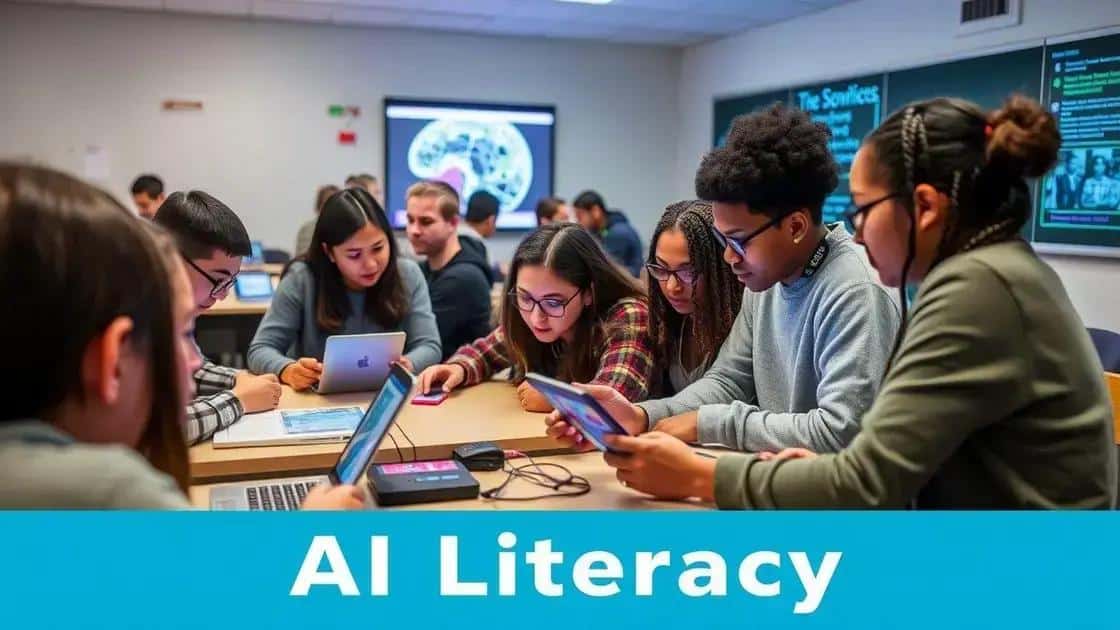AI literacy campaigns trends you need to know

AI literacy campaigns aim to enhance understanding and usage of artificial intelligence, helping individuals acquire essential skills for future job markets and technology integration.
AI literacy campaigns are transforming how we understand and interact with technology. Are you curious about their recent trends and what they mean for our education system? Let’s dive into the latest developments that are shaping our learning landscape.
Understanding AI literacy campaigns
Understanding AI literacy campaigns is vital in today’s technology-driven world. These campaigns aim to boost our ability to comprehend and utilize artificial intelligence in various aspects of life. They teach not only the fundamentals of AI but also how to critically engage with emerging technologies.
Many organizations are stepping up to promote AI literacy. For instance, educational institutions are implementing programs designed to educate students about AI’s potential and impact. Through workshops and hands-on activities, learners can explore AI in a fun and engaging way.
Key Components of AI Literacy Campaigns
Effective AI literacy campaigns focus on several key elements:
- Accessible Resources: Providing easy-to-understand materials helps demystify AI.
- Practical Applications: Real-world examples show how AI can be applied in everyday scenarios.
- Collaboration: Partnerships between tech companies and educational institutions enhance learning opportunities.
- Continuous Learning: Encouraging ongoing education keeps individuals updated on the latest AI developments.
In essence, AI literacy campaigns bridge the gap between technology and understanding. They empower individuals to make informed decisions about AI and its implications in society. By participating in these campaigns, communities can cultivate a more informed populace ready to navigate the challenges and opportunities AI presents.
Current trends in AI literacy education

Current trends in AI literacy education reflect the rapidly changing landscape of technology and its impact on how we learn. Educational systems worldwide are adapting by integrating AI concepts into their curricula. This shift equips students with essential skills to navigate a technology-driven future.
One notable trend is the rise of hands-on learning experiences. Schools and organizations are offering workshops where students can interact with AI tools and applications directly. This type of learning encourages engagement and practical understanding.
Emerging Techniques in AI Literacy
In addition to hands-on experiences, various teaching methods are gaining popularity:
- Project-Based Learning: Students work on real-world problems using AI solutions.
- Online Courses: Many platforms are providing affordable access to AI literacy programs.
- Collaboration with Tech Companies: Partnerships allow students to learn from industry experts.
- Gamification: Using games to teach AI concepts makes learning fun and engaging.
These methods not only enhance learning engagement but also ensure that students grasp complex ideas more easily. They inspire curiosity, which is vital for fostering a generation of technologically literate individuals.
As we look at the future, AI literacy education is likely to continue evolving. Educators are finding innovative ways to incorporate AI into existing subjects, ensuring that all students receive the knowledge they need. This proactive approach helps students to better understand the world around them and prepares them for careers where AI plays a significant role.
How organizations promote AI literacy
Organizations are increasingly recognizing the importance of AI literacy and are taking steps to promote it within communities. By providing educational resources and engaging programs, they help individuals understand artificial intelligence better. This effort enhances skills that are vital in today’s job market.
One effective way organizations promote AI literacy is through community workshops. These workshops often focus on practical skills and real-world applications of AI. Participants engage in hands-on activities where they can experiment with AI tools and techniques.
Strategies for Promoting AI Literacy
Organizations deploy various strategies to enhance AI literacy:
- Partnerships with Schools: Collaborating with educational institutions allows organizations to integrate AI into the curriculum.
- Online Learning Modules: Offering accessible courses online helps people learn at their own pace.
- Public Awareness Campaigns: Initiatives to educate the general public about AI and its impacts.
- Mentorship Programs: Connecting learners with industry experts fosters deeper understanding and guidance.
Furthermore, many organizations host AI competitions to inspire interest and creativity. These contests encourage participants to think critically and apply their knowledge in innovative ways. They also create a sense of community among learners, promoting collaboration and teamwork.
As organizations work to elevate AI literacy, they are shaping a future where individuals are better equipped to handle advanced technologies. This proactive approach ensures that communities are not just consumers of technology but informed participants who can make valuable contributions to the field.
Challenges in implementing AI literacy initiatives

Implementing AI literacy initiatives comes with several challenges that organizations need to navigate. Despite the increasing demand for AI education, various obstacles can hinder the effectiveness of these programs. Understanding these challenges is crucial for developing successful strategies.
One major challenge is the lack of trained educators who can effectively teach AI concepts. Many educators feel unprepared to cover advanced topics, which can lead to a gap in learning. This issue highlights the need for specialized training programs that equip teachers with the necessary skills.
Common Obstacles in AI Literacy Initiatives
Several common obstacles can impact the implementation of AI literacy:
- Resource Limitations: Many schools lack the funding or resources to adopt new technology and curricula.
- Rapidly Changing Technology: The fast pace of AI development makes it difficult to keep educational materials up to date.
- Public Perception: Misunderstandings about AI can create resistance within communities, making acceptance harder.
- Accessibility Issues: Ensuring all students have equal access to AI education can be challenging.
Addressing these challenges requires collaboration among schools, communities, and tech organizations. By working together, stakeholders can develop more effective programs that are sustainable in the long term. Creating awareness and excitement around AI can help foster a more positive attitude towards these initiatives.
As we observe the evolution of AI literacy programs, it becomes clear that overcoming challenges is essential for their success. Continuous support and adaptation will play a crucial role in ensuring that these initiatives provide valuable education to future generations.
FAQ – Frequently Asked Questions about AI Literacy Initiatives
What is the importance of AI literacy?
AI literacy is crucial as it prepares individuals to understand and utilize artificial intelligence in various fields, enhancing their employability.
What challenges do organizations face in promoting AI literacy?
Organizations encounter challenges such as limited resources, a lack of trained educators, and rapidly changing technology that can hinder effective teaching.
How can hands-on workshops improve AI understanding?
Hands-on workshops provide practical experiences, allowing participants to interact with AI tools, making learning engaging and effective.
What strategies can communities use to promote AI literacy?
Communities can promote AI literacy through partnerships with educational institutions, offering online courses, and facilitating mentorship programs.






